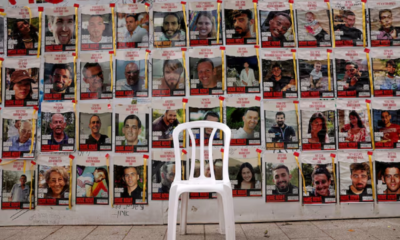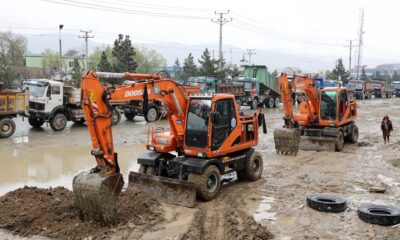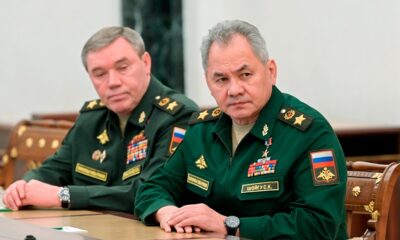Regional
Iran sends Russia hundreds of ballistic missiles
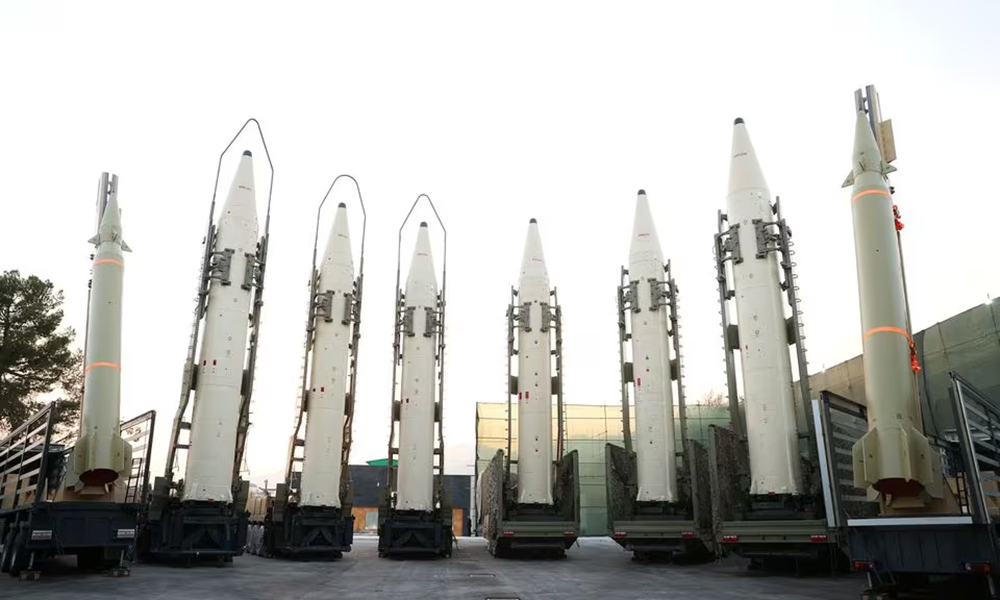
Iran has provided Russia with a large number of powerful surface-to-surface ballistic missiles, six sources told Reuters, deepening the military cooperation between the two U.S.-sanctioned countries, Reuters reported.
Iran’s provision of around 400 missiles includes many from the Fateh-110 family of short-range ballistic weapons, such as the Zolfaghar, three Iranian sources said. This road-mobile missile is capable of striking targets at a distance of between 300 and 700 km (186 and 435 miles), experts say.
Iran’s defence ministry and the Revolutionary Guards – an elite force that oversees Iran’s ballistic missile programme – declined to comment. Russia’s defence ministry did not immediately respond to a request for comment.
The shipments began in early January after a deal was finalised in meetings late last year between Iranian and Russian military and security officials that took place in Tehran and Moscow, one of the Iranian sources said.
An Iranian military official – who, like the other sources, asked not to be identified because of the sensitivity of the information – said there had been at least four shipments of missiles and there would be more in the coming weeks. He declined to provide further details.
Another senior Iranian official said some of the missiles were sent to Russia by ship via the Caspian Sea, while others were transported by plane, read the report.
“There will be more shipments,” the second Iranian official said. “There is no reason to hide it. We are allowed to export weapons to any country that we wish to.”
U.N. Security Council restrictions on Iran’s export of some missiles, drones and other technologies expired in October. However, the United States and European Union retained sanctions on Iran’s ballistic missile programme amid concerns over exports of weapons to its proxies in the Middle East and to Russia.
A fourth source, familiar with the matter, confirmed that Russia had received a large number of missiles from Iran recently, without providing further details.
White House national security spokesperson John Kirby said in early January the United States was concerned that Russia was close to acquiring short-range ballistic weapons from Iran, in addition to missiles already sourced from North Korea.
A U.S. official told Reuters that Washington had seen evidence of talks actively advancing but no indication yet of deliveries having taken place.
The Pentagon did not immediately respond to a request for comment on the missile deliveries.
Ukraine’s top prosecutor said on Friday the ballistic missiles supplied by North Korea to Russia had proven unreliable on the battlefield, with only two of 24 hitting their targets. Moscow and Pyongyang have both denied that North Korea has provided Russia with munitions used in Ukraine.
By contrast, Jeffrey Lewis, an expert with the Middlebury Institute of International Studies at Monterey, said the Fateh-110 family of missiles and the Zolfaghar were precision weapons.
“They are used to point at things that are high value and need precise damage,” said Lewis, adding that 400 munitions could inflict considerable harm if used in Ukraine. He noted, however, that Russian bombardments were already “pretty brutal”.
A Ukrainian military source told Reuters that Kyiv had not registered any use of Iranian ballistic missiles by Russian forces in the conflict. The Ukrainian defence ministry did not immediately reply to Reuters’ request for comment.
Following the publication of this story, a spokesperson for Ukraine’s Air Force told national television that it had no official information on Russia obtaining such missiles. He said that ballistic missiles would pose a serious threat to Ukraine.
Former Ukrainian defence minister Andriy Zagorodnyuk said that Russia wanted to supplement its missile arsenal at a time when delays in approving a major package of U.S. military aid in Congress has left Ukraine short of ammunition and other material.
“The lack of U.S. support means shortages of ground-based air defence in Ukraine. So they want to accumulate a mass of rockets and break through Ukrainian air defence,” said Zagorodnyuk, who chairs the Kyiv-based Centre for Defence Strategies, a security think tank, and advises the government.
Kyiv has repeatedly asked Tehran to stop supplying Shahed drones to Russia, which have become a staple of Moscow’s long-range assaults on Ukrainian cities and infrastructure, alongside an array of missiles.
Ukraine’s air force said in December that Russia had launched 3,700 Shahed drones during the war, which can fly hundreds of kilometres and explode on impact. Ukrainians call them “mopeds” because of the distinctive sound of their engines; air defences down dozens of them each week.
Iran initially denied supplying drones to Russia but months later said it had provided a small number before Moscow launched the war on Ukraine in 2022.
“Those who accuse Iran of providing weapons to one of the sides in the Ukraine war are doing so for political purposes,” Iranian Foreign Ministry spokesperson Nasser Kanaani said on Monday, when asked about Tehran’s delivery of drones to Russia. “We have not given any drones to take part in that war.”
Rob Lee, a senior fellow at the Foreign Policy Research Institute, a Philadelphia-based think tank, said a supply of Fateh-100 and Zolfaghar missiles from Iran would hand Russia an even greater advantage on the battlefield.
“They could be used to strike military targets at operational depths, and ballistic missiles are more difficult for Ukrainian air defences to intercept,” Lee said.
Iran’s hardline clerical rulers have steadily sought to deepen ties with Russia and China, betting that would help Tehran to resist U.S. sanctions and to end its political isolation.
Defence cooperation between Iran and Russia has intensified since Moscow sent tens of thousands of troops into Ukraine in February 2022.
Russia’s Defence Minister Sergei Shoigu met the head of Iran’s Revolutionary Guards Aerospace Force, Amirali Hajizadeh, in Tehran in September, when Iran’s drones, missiles and air defence systems were displayed for him, Iranian state media reported.
And last month, Russia’s foreign ministry said it expected President Vladimir Putin and his Iranian counterpart Ebrahim Raisi to sign a broad new cooperation treaty soon, following talks in Moscow in December.
“This military partnership with Russia has shown the world Iran’s defence capabilities,” said the military official. “It does not mean we are taking sides with Russia in the Ukraine conflict.”
The stakes are high for Iran’s clerical rulers amid the war between Israel and Palestinian Islamist group Hamas that erupted after Oct. 7. They also face growing dissent at home over economic woes and social restrictions.
While Tehran tries to avoid a direct confrontation with Israel that could draw in the United States, its Axis of Resistance allies – including Hezbollah in Lebanon and the Houthis in Yemen – have attacked Israeli and U.S. targets.
A Western diplomat briefed on the matter confirmed the delivery of Iranian ballistic missiles to Russia in the recent weeks, without providing more details, Reuters reported.
He said Western nations were concerned that Russia’s reciprocal transfer of weapons to Iran could strengthen its position in any possible conflict with the United States and Israel.
Iran said in November it had finalised arrangements for Russia to provide it with Su-35 fighter jets, Mi-28 attack helicopters and Yak-130 pilot training aircraft.
Analyst Gregory Brew at Eurasia Group, a political risk consultancy, said Russia is an ally of convenience for Iran.
“The relationship is transactional: in exchange for drones, Iran expects more security cooperation and advanced weaponry, particularly modern aircraft,” he said.
Regional
China to host Hamas, Fatah for Palestinian unity talks

China will host Palestinian unity talks between Hamas and its rivals Fatah, the two groups and a Beijing-based diplomat said on Friday, a notable Chinese foray into Palestinian diplomacy amid the war in the Gaza Strip.
Hamas, which controls Gaza, is the group whose fighters stormed into Israeli towns on Oct. 7, killing 1,200 people and capturing 253 hostages. Israel has sworn to annihilate Hamas in an onslaught that has killed more than 34,000 Palestinians.
Fatah is the movement of Mahmoud Abbas, president of the Western-backed Palestinian Authority, which exercises limited self-rule in the Israeli occupied West Bank.
The two rival Palestinian factions have failed to heal their political disputes since Hamas fighters expelled Fatah from Gaza in a short war in 2007. Washington is wary of moves to reconcile the two groups, as it supports the PA but has banned Hamas as terrorists.
A Fatah official told Reuters a delegation, led by the group’s senior official Azzam Al-Ahmed, had left for China. A Hamas official said the faction’s team for the talks, led by senior Hamas official Moussa Abu Marzouk, would be flying there later on Friday.
“We support strengthening the authority of the Palestinian National Authority, and support all Palestinian factions in achieving reconciliation and increasing solidarity through dialogue and consultation,” said Chinese Foreign Ministry spokesperson Wang Wenbin at a regular briefing on Friday, without confirming the meeting.
The visit will be the first time a Hamas delegation is publicly known to have gone to China since the start of the war in Gaza. A Chinese diplomat, Wang Kejian, met Hamas chief Ismail Haniyeh in Qatar last month, according to the Chinese foreign ministry.
The Beijing-based diplomat, who had been briefed on the matter, said the talks aimed to support efforts to reconcile the two Palestinian rival groups.
China has lately demonstrated growing diplomatic influence in the Middle East, where it enjoys strong ties with Arab nations and Iran. Last year, Beijing brokered a breakthrough peace deal between longstanding regional foes Saudi Arabia and Iran.
U.S. Secretary of State Antony Blinken said he discussed with Chinese President Xi Jinping and other officials in Beijing on Friday how China can play a constructive role in global crises, including the Middle East.
Chinese officials have ramped up advocacy for the Palestinians in international forums in recent months, calling for a larger-scale Israeli-Palestinian peace conference and a specific timetable to implement a two-state solution.
In February, Beijing urged the International Court of Justice (ICJ) to give its opinion on the Israeli occupation of the Palestinian Territories, which it said was illegal.
More recently, China has been pushing for Palestine to join the United Nations, which Beijing’s top diplomat Wang Yi said last week would “rectify a prolonged historical injustice”.
(Reuters)
Regional
New UK sanctions target Iranian drone industry

Britain on Thursday announced new sanctions targeting Iran’s military drone industry, in response to Iran’s drone and missile attack on Israel earlier this month.
The measures, taken in co-ordination with the U.S. and Canada, target four businesses and two directors at a network of drone companies with the aim of limiting Iran’s ability to launch drones.
“The Iranian regime’s dangerous attack on Israel risked thousands of civilian casualties and wider escalation in the region,” British Foreign Secretary David Cameron said in a statement.
“Today the UK and our partners have sent a clear message – we will hold those responsible for Iran’s destabilising behaviour to account.”
Britain also said it would introduce new bans on the export of drone and missile components to Iran, seeking to limit its military capabilities.
Last week, Britain imposed sanctions on Iranian military figures and organisations, in another coordinated move with the United States, following Iran’s action against Israel.
Iran launched drones and fired missiles at Israel on April 13 as a retaliatory strike for the attack on its embassy compound in Damascus two weeks prior, raising the risk of further escalation in conflict in the Middle East.
(Reuters)
Regional
Turkey accuses U.S. of double standards over Gaza in rights report
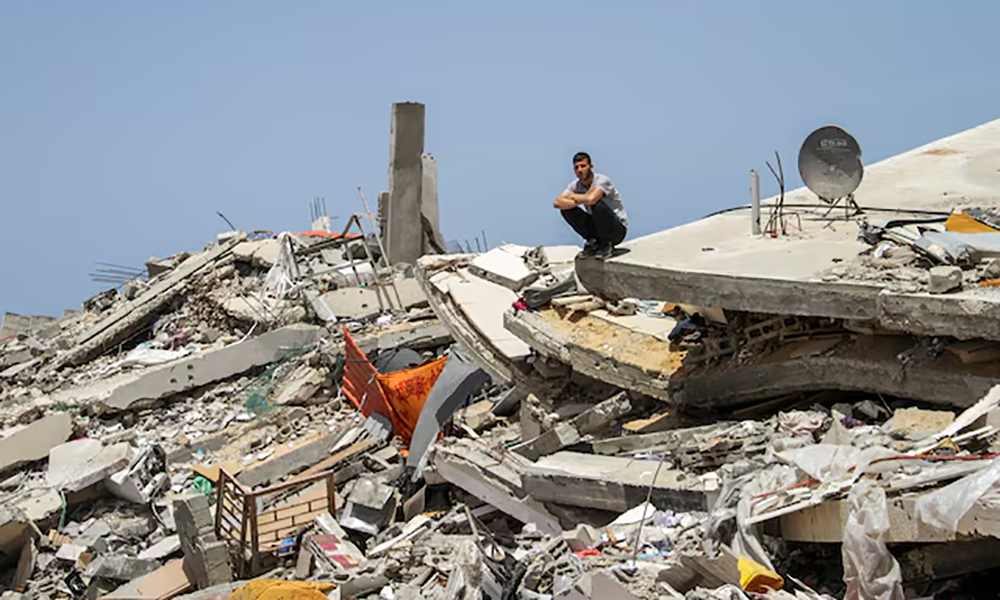
Turkey on Wednesday accused the United States of having a policy of double standards on human rights, saying Washington’s annual rights report failed to reflect Israel’s assaults in Gaza, Reuters reported.
Turkey’s foreign ministry said in a statement it was deeply concerned that the U.S. report did not “duly reflect the ongoing inhumane attacks in Gaza”.
The report was prepared with “political motives, far from impartiality and objectivity”, it said, calling on Washington to cease its “double-standard policy on human rights”.
It also cited U.S. ties with the Syrian Kurdish YPG militia which Ankara deems a terrorist organisation.
Israeli forces have killed more than 34,000 Palestinians in Gaza, according to health authorities there, many of them civilians and children. The enclave has been reduced to a wasteland and extreme food shortages have prompted fears of famine.
Israel launched its assault in response to an attack by the Hamas militant group on Oct. 7 in which Israel says 1,200 people were killed. It denies allegations of deliberately causing humanitarian suffering and targeting civilians.
Turkey has denounced Israel for its campaign in Gaza and called for a ceasefire. It has also criticised Western countries for what it calls their unconditional support of Israel, read the report.
In its report, the U.S. State Department said Israel’s war against Hamas had a “significant negative impact” on the human rights situation in Israel.
On Monday, U.S. Secretary of State AntZony Blinken rejected suggestions that Washington might have double standards over Israel’s record.
-

 Latest News4 days ago
Latest News4 days agoRashid Khan named AWCC’s brand ambassador
-

 World4 days ago
World4 days agoMalaysian navy helicopters collide in mid-air, 10 killed
-

 Sport4 days ago
Sport4 days agoJaiswal ton powers Rajasthan to big IPL win
-

 World4 days ago
World4 days agoNorth Korea officials visit Iran in a rare public trip
-

 Latest News5 days ago
Latest News5 days agoAt least 1,500 families affected by recent floods: IRW
-

 Sport5 days ago
Sport5 days agoMawj Sahil player scores stunning halfway line goal in 1-0 win over Jawanan Wahedi
-

 Sport3 days ago
Sport3 days ago‘Serious talent’ Fraser-McGurk bonds with Warner to light up IPL
-

 Latest News4 days ago
Latest News4 days agoUS report cites ‘significant deterioration’ in Afghan women’s rights last year




